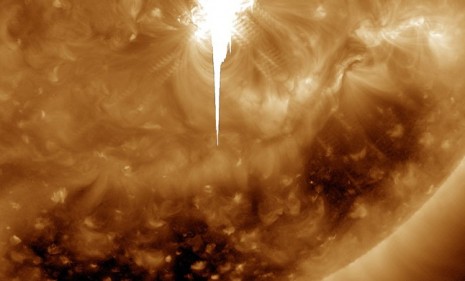The 'massive' solar storm: 4 possible repercussions
A giant burst of magnetic energy from the sun is zapping the earth. Here's why we may not come out unscathed

A free daily email with the biggest news stories of the day – and the best features from TheWeek.com
You are now subscribed
Your newsletter sign-up was successful
A huge eruption of solar radiation is hitting the Earth, and will continue through Saturday. The Class X burst — the most powerful type of solar flare — is the biggest since 2006, and it's expected to kick off a two-year period of intense solar activity. The solar flares occur when "magnetic field lines on the sun's surface in effect get short-circuited" and shoot bursts of energy into space. While no one's completely sure how this will affect our planet, here are four possible ways the "massive" solar flare could mess with, or in some cases beautify, the world:
1. Trigger communication blackouts
Solar flares can wreak havoc on the Earth's communication systems and electrical grids, and this flare is already jamming shortwave radio communication in parts of China. Similar solar flares knocked out phone service in Illinois in 1972 and left six million Canadians without power in 1989. "The sun giveth, and the sun taketh away," says Nicholas Deleon in CrunchGear.
The Week
Escape your echo chamber. Get the facts behind the news, plus analysis from multiple perspectives.

Sign up for The Week's Free Newsletters
From our morning news briefing to a weekly Good News Newsletter, get the best of The Week delivered directly to your inbox.
From our morning news briefing to a weekly Good News Newsletter, get the best of The Week delivered directly to your inbox.
2. Fry satellites — and GPS gadgets
The solar storm in 2006 disrupted GPS systems, says Lisa Grossman in Wired. And "satellite navigation was barely a consumer product" then, says Jason Palmer in BBC News. Today GPS devices guide not only cars and emergency vehicles, but are critical to boats, trains and military operations.
3. Destroy years of work on your novel
The burst of solar activity exposes a pitfall of storing art and writing on computers, author Margaret Atwood told the 2011 Tools of Change for Publishing conference. "The stupid side of electronic information includes: one big solar flare and it's gone," she said. "If there's something you really, really want to save and you think there's going to be a solar flare or an electromagnetic pulse of any kind, get yourself a lead-lined safe and put it in there."
A free daily email with the biggest news stories of the day – and the best features from TheWeek.com
4. Jazz up the northern lights
It's not all bad, says Melissa Bell in The Washington Post. Expect "awesome northern lights." When the solar wind hits the Earth's magnetic field, colorful sparks fly, and the effect is a brighter aurora borealis that extends further south, possibly visible from part of the continental U.S. "What's more, though a full moon often outshines the auroras, this storm may be so powerful as to mix moonlight and northern lights in one spectacular swirl," says Wired's Grossman. "So look up!"
-
 Film reviews: ‘Send Help’ and ‘Private Life’
Film reviews: ‘Send Help’ and ‘Private Life’Feature An office doormat is stranded alone with her awful boss and a frazzled therapist turns amateur murder investigator
-
 Movies to watch in February
Movies to watch in Februarythe week recommends Time travelers, multiverse hoppers and an Iraqi parable highlight this month’s offerings during the depths of winter
-
 ICE’s facial scanning is the tip of the surveillance iceberg
ICE’s facial scanning is the tip of the surveillance icebergIN THE SPOTLIGHT Federal troops are increasingly turning to high-tech tracking tools that push the boundaries of personal privacy